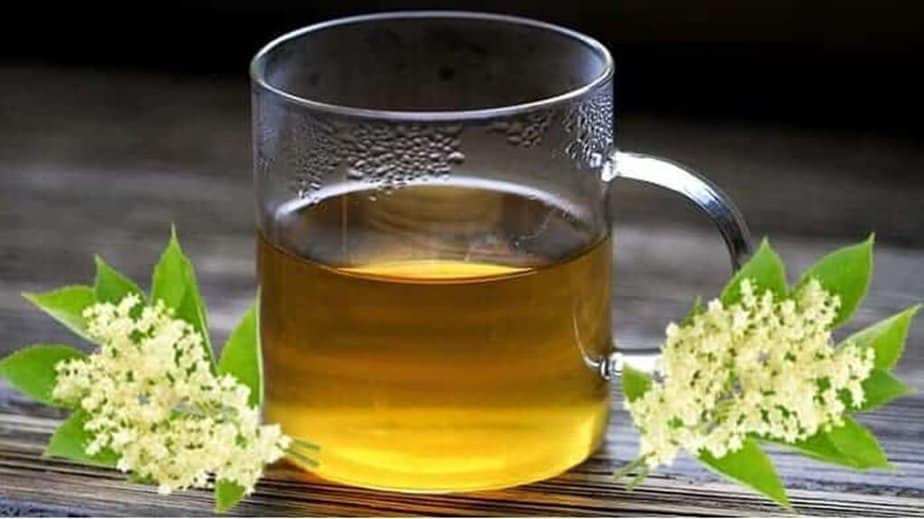From the ancient periods, elderflower tea has been in use for its many health benefits and healing properties. Obviously, it’s different from the usual black or green teas which all of us are familiar with.
In this article, you’ll read “What is elderflower tea”, its benefits and uses, and the recipe for making this tea.
What is Elderflower Tea?
Elderflower tea, also known as elder blossom tea or elderberry tea, is an aromatic, sweet, lightly floral tea made with elderflower. Either fresh or dried flower petals can be used for making this healthy refreshing drink.
By the way, elderflowers are the blossoms of the elder tree (Sambucus) that belong to the Adoxaceae family of plants, native to Europe, North Africa, and North America. This seasonal flower blossoms only in June to July months.
Traditionally, elderflower is best known for its use in making cordials and syrups meant for flavoring cocktails, liqueurs, desserts, and baked goods. Elderflower tea has a long history of use in German medicine and different systems of herbal medicines across the world. Currently, there is an increasing interest and demand for elderflower tea as more and more people want to enjoy its wide range of health benefits.
Today, you can buy elderflower tea bags and pouches from supermarkets. Dried elderflower petals are on sale throughout the year in most supermarkets and herbal tea stores.
RELATED: Elderflower and Elderberry
Nutrition
A cup of elder blossom tea can offer you only an insignificant amount of vitamins and minerals but it contains a good bit of antioxidants and several medicinal properties. Each cup of this tea (three teaspoons of dried petals) contains a handsome amount of quercetin, anthocyanins, isoquercitrin, chlorogenic acids, and triterpenoids.
Besides, while drinking a cup of elder blossom tea you get only less than 50 calories, and no fats and proteins. Thus it’s a healthy alternative to other sugary beverages and coffee. In short, the health benefits of elderflower tea are many with little or no adverse effects on your diet.
What Does Elderflower Tea Taste Like?
Elderflower tea tastes earthy and floral with a mild sweetness. The aroma of elder blossom tea is floral and distinctly musky and sweet.
It doesn’t have any strong taste though you’ll experience a mild floral fragrance. You can drink it without a sweetener as it is already sweet. However, adding one or two teaspoons of honey to your elderberry tea makes it tastier and healthy. Some love to enjoy this tea with a few drops of lemon juice added to it for a lovely citrusy tang.
Elderflower Tea Recipe
It is easy to make elderflower tea either using freshly picked flowers or dried flower petals. Here is the recipe for making 1 cup of elder blossom tea:
Ingredients:
- 2 teaspoons dried flower petals (or 2 tablespoons fresh flower petals)
- 2 teaspoons honey (optional)
- 5 drops of lemon juice (optional)
- 1 cup water
Allow the flower petals to simmer in the boiling water for 5 minutes in a pot covered with a lid. Once the tea is cooled down, strain out the petals and mix honey and lemon juice in it just before drinking.
What Are Elderflower Tea Benefits?
The flowers, berries, barks, leaves, and roots of elder trees are well known for the several bioactive properties they contain. Elderflower tea has a long history of use in German medicine.
It’s a traditional herbal medicine used to treat a wide array of common diseases and health conditions. Despite its popularity, there isn’t any verified scientific evidence to support the benefits of elderflower tea or the medicinal benefits of elder plants.
Take 2 to 3 cups of tea per day to experience the benefits of elder blossom tea.
Users of elderflower tea, who heavily rely on traditional wisdom, vouch for the flowing remedial benefits:
- Common cold.
- Constipation.
- Cough.
- Diabetes.
- Flu (influenza).
- Bronchitis.
- Rhinosinusitis.
- Rhinosinusitis.
- Minor bleeding.
- Rheumatoid arthritis.
- Sore eyes.
Note: More evidence is needed to rate the effectiveness of elderflower for the above uses and benefits.
Miscellaneous Facts
Here are a few more useful facts on elderflower tea:
- This tea is rich in Vitamin C.
- The elderflower petals are not poisonous but the stems and leaves have a toxic element that can make you sick.
- Don’t include nods, internodes, and twigs but use only the flower petals of making the tea.
- Always make fresh tea before you drink; do not make the tea and keep it for long.
- Elderflower tea does not contain caffeine and it’s gluten-free.
Final Thoughts
Elderflower tea is known for its many health benefits and people have been drinking this tea since ancient times. It’s a frequently used home remedy for the common cold, influenza, cough, nausea, and constipation. Sufficient evidence is not there for the scientific backing of its benefits.
Related articles:
- What are the benefits of soursop tea?
- Does Iaso tea help weight loss?
- What is Kombucha tea?
- How to use green tea for weight loss?
